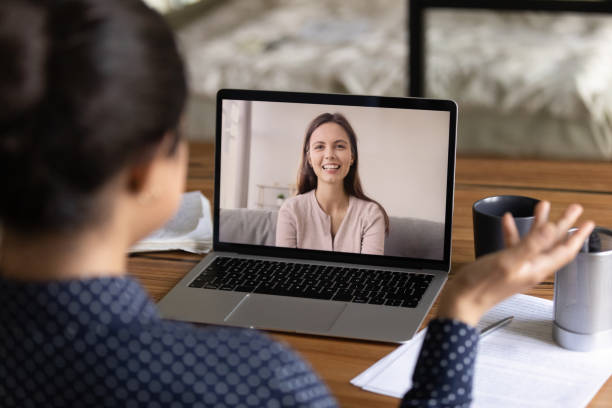Job interviews bring on the nerves. It’s not something people have to do too often, and the unfamiliarity can heighten anxiety, especially when it comes to video interviews. With the shift towards remote work and digital recruitment processes, mastering the art of video interviews is a must have skill.
This guide aims to help you with everything you need to know and provide expert video interview tips for candidates.
Understanding video interviews
Video interviews are a newer trend in hiring. Preparing for them may seem daunting. Yet, with the right approach, they can be navigated successfully. Candidates can make a strong impression, even remotely.
Interviews may be conducted virtually for all types of roles, including graduate programmes, apprenticeships, and internal promotions.
The rise of video interviews: A trend shaping the job market
Online video interviews have seen a dramatic increase since 2020. Employers are opting to hold virtual interviews as a time and cost saver. It can be beneficial for the interviewee and the interview panel alike.
Types of video interviews
Interviews of all kinds can spike people’s anxiety. The remote nature of a video interview adds a unique challenge. Candidates should adapt their interview style to benefit from the virtual nature of video interviews.
To do that, take a look at the two most common types of video interviews:
Live video interviews
Live video interviews are the most common type handled over video conferencing software.
Here are the details you need to know about live video interviews:
- Real time interaction: These interviews are conducted live, offering immediate interaction between the candidate and the interviewer.
- Platforms used: Common platforms include Zoom, Skype, and Microsoft Teams.
- Dynamic environment: They mimic the dynamics of in-person interviews, allowing for spontaneous questions and answers.
- Preparation: Candidates need to prepare as they would for a traditional interview, with an added focus on technology and environment setup.
Pre-recorded video interviews
Pre-recorded video interviews, sometimes known as automated interviews, are less personal as there won’t be an interviewer present. Instead, candidates will do a self-recorded video interview answering open and closed questions, which will be reviewed later.
Here is how pre-recorded video interviews differ:
- Flexibility: Candidates can record their answers at a convenient time within a specified deadline.
- Structured format: Questions are usually predetermined, and candidates record their responses.
- Review process: The recorded responses are submitted and reviewed by the hiring team at a later time.
- Unique challenges: This format requires candidates to convey their personality and professionalism without the benefit of real-time interaction.
Adaption is the name of the game. One-way video interviews can feel less personal. Focus on how you want to present yourself.
Conquering video interviews: A step-by-step guide to success
Successful candidates should come across naturally and easily, demonstrating confidence without appearing rehearsed. You’ve already beaten out most of the competition by writing a winning cover letter and demonstrating your experience on a CV.
Preparation is key: Equipping yourself for video interview success
Preparing for a video interview should be handled in the same way as a traditional interview. Hiring managers are trying to assess whether you’re a good fit for the company.
However, with video interviews, there are a few specific things you need to do to be ready:
- Research the company and role: Dive into the company’s history, mission, and recent news. Understand the job description and required skills. Keep a list of talking points so you don’t forget.
- Understand the interview process and format: Know if it’s live or pre-recorded. Familiarise yourself with the software to be used. Make sure to download any needed software before the interview date.
- Choose a suitable environment: Opt for a quiet room. Ensure the background is clean and professional. Keep animals away, as they can be a distraction.
- Ensure proper technical setup: Check your internet speed. Test your camera and microphone for clarity.
- Dress for the interview: Wear a professional interview outfit. Ensure your appearance is neat and presentable.
- Maintain professionalism: Practise good posture. Look into the camera to simulate eye contact. Smile and try to stay relaxed.
Keep a glass of water nearby to calm pre-interview nerves. Having a notepad and pen ready for jotting down any important points during the conversation is also a good idea.
Following up: Leaving a lasting impression
After your video interview, follow up with an email to leave a lasting impression on the hiring manager. Here’s how:
- Send a thank you email: Within 24 hours post-interview, send a personalised thank you email to each interviewer. Express gratitude for their time and the opportunity to learn more about the role and the company.
- Add value: Briefly mention any ideas or insights that could benefit the team or project you discussed. This demonstrates your proactive thinking and commitment to contributing from the start.
- Keep it concise: Your follow-up should be thoughtful yet succinct. Respect the interviewer’s time by keeping your email to a few short paragraphs.
- Professional closing: End your email with a professional closing, reiterating your thanks and expressing your eagerness to hear back.
The goal of your follow-up is to thank the interviewer, reinforce your suitability for the role and make a memorable impression.
Ace video interview questions: Tips to answer the most common questions
No matter what kind of interview you’re doing, live or pre-recorded, it’s also best to come prepared to help you stay calm during the job interview. Here’s how to get ready for a video interview:
Prepare sample responses
- Use the STAR Method: For questions about your experiences, structure your answers with the Situation, Task, Action, and Result method. This approach helps you deliver clear and concise responses.
- Practise out loud: Rehearse your answers to common questions aloud. This will help you become more comfortable with your responses and reduce filler words.
Preparation helps ease any nerves you may have. Managing Director of People Performance Neil O’Brien suggests knowing the job, who will be at the interview, and where you’re going can ease pre-interview nerves:
“Stress is driven by a sense of loss of control. By following the steps below, we give ourselves more control and, thus, lower stress.”
Demonstrate your knowledge and skills
- Match your skills with job requirements: Review the job description and note how your skills and experiences align with the role. Mention these specifically in your answers.
- Use specific examples: Provide concrete examples of your work to demonstrate your skills and achievements. Quantify your results whenever possible.
Expert interview coach Paul Mullen has noted that passion and interest are important to hiring managers.
“Body language and tone of voice will be painting a picture for the interviewer, they will be reading these signals during the interview. Don’t be a mannequin, let your passion come through in an interview.”
Be enthusiastic and passionate
- Express genuine interest: Show enthusiasm for the role and the company. Explain why you’re excited about the opportunity and how it aligns with your career goals.
- Let your personality shine: Be yourself. Your unique personality is a significant part of what makes you the right fit for the team.
Ask insightful questions
- Research the company: Use your research about the company to formulate questions that show you’ve done your homework and are genuinely interested in the role.
- Ask about the team and culture: Ask questions about the role, including who you’ll be working with, the company culture, and how success is measured in the role. This shows you’re thinking about how you’ll fit in and contribute.
Paul Mullen suggests tailoring your answers to common questions like “why should we hire you?”:
“Remember just like a cv, prepare your answer tailored for the company you’re interviewing for, be concise. Being too general won’t set you apart and it might also mean delivering a response longer than the average interview answer which is 1-2 minutes.”
Handling unexpected situations in a video interview
In preparing for a video interview, anticipate potential technical glitches by testing your equipment beforehand and having a backup device ready. Familiarise yourself with the interview platform’s features, such as how to mute and unmute your microphone or turn your video on and off.
If you encounter unexpected questions or technical issues, stay calm and address the situation professionally. Take a moment to think about your responses to unexpected questions, and don’t hesitate to ask for clarification if needed.
Minimise potential distractions by informing housemates of your interview and turning off notifications on your devices. After the interview, if any technical issues arose, mention them in your thank-you email, apologising for any inconvenience and thanking the interviewers for their understanding.
Ace your video interview with help from Recruit Ireland
Head over to the Recruit Ireland advice centre to find a wide range of information about job interviews.
Whether preparing for your first video interview or trying to refine your technique, Recruit Ireland offers expert guidance to navigate the process successfully.
From detailed articles on answering common interview questions to tips on making a great impression remotely, you’ll find resources tailored to help you stand out in a competitive job market.










